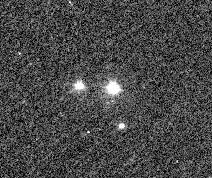Astronomy:3C 147
| 3C 147 | |
|---|---|
 Hubble Legacy Archive WFPC2 image of 3C 147 | |
| Observation data (Epoch J2000) | |
| Constellation | Auriga |
| Right ascension | 05h 42m 36.138s[1] |
| Declination | +49° 51′ 07.23″[1] |
| Redshift | 0.545[1][2] |
| Distance | 5.1 billion light-years (Light travel time)[2] 6.4 billion light-years (present)[2] |
| Type | Quasar[3] Core-Dominated[2] Seyfert 1[1][2] |
| Apparent magnitude (V) | 17.8[1][2] |
| Other designations | |
| PGC 2355407, 2E 1506, 2MASS J05423614+4951071, QSO B0538+498[1] | |
| See also: Quasar,List of quasars]] | |
3C 147 (B0538+498) is a compact steep-spectrum (CSS) quasar[3] that was discovered in 1964. It is located in the constellation Auriga not far in the sky from the 5th magnitude star Omicron Aurigae.
The "distance" of a far away galaxy depends on the distance measurement used. With a redshift of 0.545,[1][2] light from this active galaxy is estimated to have taken around 5.1 billion years to reach Earth.[2] But as a result of the expansion of the Universe, the present (co-moving) distance to this galaxy is about 6.4 billion light-years (1974 Mpc).[2]
Very Long Baseline Array (VLBA) observations have identified a complex central region that is dominated by two bright components, A and B.[3] The separation between the two central components of the source seems to be increasing with an apparent velocity (superluminal motion) of 1.2 ± 0.4 c.[3]
3C 147 is one of four primary calibrators used by the Very Large Array (along with 3C 48, 3C 138, and 3C 286). Visibilities of all other sources are calibrated using observed visibilities of one of these four calibrators.[4]
See also
References
- ↑ 1.0 1.1 1.2 1.3 1.4 1.5 1.6 "3C 147". SIMBAD. Centre de données astronomiques de Strasbourg. http://simbad.u-strasbg.fr/simbad/sim-basic?Ident=3C+147.
- ↑ 2.0 2.1 2.2 2.3 2.4 2.5 2.6 2.7 2.8 "NASA/IPAC Extragalactic Database". Results for 3C 147. http://nedwww.ipac.caltech.edu/cgi-bin/nph-objsearch?objname=3C+147&img_stamp=yes&extend=no.
- ↑ 3.0 3.1 3.2 3.3 Rossetti, A.; Mantovani; Dallacasa; Junor; Salter; Saikia (2009). "VLBA polarimetric observations of the CSS quasar 3C 147". Astronomy & Astrophysics 504 (3): 741–749. doi:10.1051/0004-6361/200811190. Bibcode: 2009A&A...504..741R.
- ↑ Witz, Stephan W. (4 December 2015). "Calibration and Flux Density Scale". National Radio Astronomy Observatory. https://science.nrao.edu/facilities/vla/docs/manuals/oss/performance/fdscale.
External links
- Wikisky image of 3C 147 (PGC 2355407)
 |
